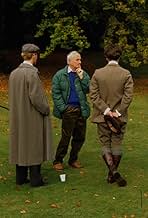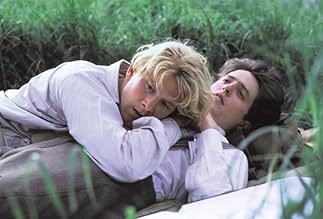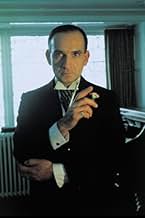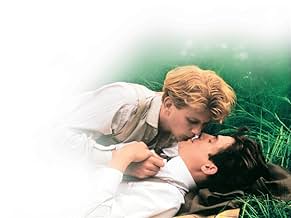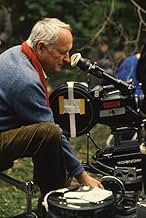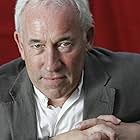Two English school chums find themselves falling in love at Cambridge. To regain his place in society, Clive gives up Maurice and marries. While staying with Clive and his wife, Maurice disc... Read allTwo English school chums find themselves falling in love at Cambridge. To regain his place in society, Clive gives up Maurice and marries. While staying with Clive and his wife, Maurice discovers romance in the arms of the gamekeeper Alec.Two English school chums find themselves falling in love at Cambridge. To regain his place in society, Clive gives up Maurice and marries. While staying with Clive and his wife, Maurice discovers romance in the arms of the gamekeeper Alec.
- Director
- Writers
- Stars
- Nominated for 1 Oscar
- 3 wins & 2 nominations total
- Director
- Writers
- All cast & crew
- Production, box office & more at IMDbPro
Featured reviews
I remember I saw this movie I was about 17. I'd read the book and fell in love. It tells a love story between two men and the way they have to carry it out despite society rules (with some changes it still happens nowadays...).
The general message would be "love conquers all" but is it really so? Are Maurice and Scudder able to live happily ever after? I doubt, and on the beginning of the XXth century it would be even worse.
Despite all, it's lovely to watch the same kind of story we're used to watching in movies that portray society in different times, but now speaking about love between men! Although James Ivory's work is beyond criticism, in my point a view, there were some scenes in the book (the one when they are in London, sitting naked by the fire, for instance) that really should be in the movie.
But it's a tender and romantic approach of of book (only published after E.M. Foster's death) that surely would have pleased it's author.
The general message would be "love conquers all" but is it really so? Are Maurice and Scudder able to live happily ever after? I doubt, and on the beginning of the XXth century it would be even worse.
Despite all, it's lovely to watch the same kind of story we're used to watching in movies that portray society in different times, but now speaking about love between men! Although James Ivory's work is beyond criticism, in my point a view, there were some scenes in the book (the one when they are in London, sitting naked by the fire, for instance) that really should be in the movie.
But it's a tender and romantic approach of of book (only published after E.M. Foster's death) that surely would have pleased it's author.
A gay classic that is situated at the beginning of the twentieth century. 'Maurice' is the story of Maurice Hall, a student at the University of Cambridge, United Kingdom. There he meets Clive Durham. Both men develop a strong friendship, which to a certain level, becomes physical. Clive is gay, but Maurice doesn't want to know anything about it. Until he admits he also has feelings for persons of the same sex, even though in intellectual circles homosexuality is 'the love that dare not speak its name'.
Maurice doesn't know how to behave. Of course he wants to be himself, but society doesn't accept gay people. When he more or less decides to live as a gay man bosom friend Clive changes his mind, frightened by a lawsuit against a gay man. According to Clive the physical friendship between Maurice and Clive must end and from that moment on he wants to experience real love: the love of a woman. The relation between Maurice and Clive gets tense.
Even Maurice tries to get his sexual preference changed by visiting a hypnotist, but the treatment fails. That becomes very clear when Maurice sleeps with Scudder, Clive's under gamekeeper. A passionate love develops between Scudder and Maurice, which makes Clive realize what kind of appearance he has to keep up as a 'converted' gay man.
'Maurice' is based on the novel of the same name written by E.M. Forster. The film is beautiful and made with a feeling for historical notion. The actors playing the leading roles are straight in real life but act the gay roles in a beautiful way. Actually everything in the film is right: image, usage of language, costumes and music.
Maurice doesn't know how to behave. Of course he wants to be himself, but society doesn't accept gay people. When he more or less decides to live as a gay man bosom friend Clive changes his mind, frightened by a lawsuit against a gay man. According to Clive the physical friendship between Maurice and Clive must end and from that moment on he wants to experience real love: the love of a woman. The relation between Maurice and Clive gets tense.
Even Maurice tries to get his sexual preference changed by visiting a hypnotist, but the treatment fails. That becomes very clear when Maurice sleeps with Scudder, Clive's under gamekeeper. A passionate love develops between Scudder and Maurice, which makes Clive realize what kind of appearance he has to keep up as a 'converted' gay man.
'Maurice' is based on the novel of the same name written by E.M. Forster. The film is beautiful and made with a feeling for historical notion. The actors playing the leading roles are straight in real life but act the gay roles in a beautiful way. Actually everything in the film is right: image, usage of language, costumes and music.
I ran into this movie a long, long time ago, watching the TV news one evening back in 1987. I felt as I couldn't miss it as soon as I realized it had been shot in Cambridge, my favorite place in the world, but all my feelings went much beyond that when I saw it. I didn't feel uneasy about homosexuality at all but it was with that movie that I finally realized it was only love, no matter whether it involved a man and a woman, or two men, or two women.... The set is magnificent, the actors at their best (a great Hugh Grant who was so great as to show how Mr E.M.Forster had become tired with Clive...), and I must say that Mr Ivory did a pretty good job with his version of the story, very well adapted. In fact I do believe the book is superior in many moments but, on the other hand, the film is far far superior in many other moments, and you can't really say this all the times. I suggest everybody should watch it and enjoy it, no matter what your sexual preferences are. A masterpiece, indeed!
This is the most emotional love story I have ever viewed. I first saw the film when I was about 14, and I had no problem sitting through the entire two and a half hours of rich period drama. Merchant and Ivory are two of the best filmmakers ever, and they treat this delicate subject with grace and tact. It makes being a gay teenager a little more bearable, because it is one of the few movies in which the gay lead finds love, and survives. An altogether edifying experience.
When E M Forster wrote "Maurice" homosexuality was considered a mental illness, a criminal offence, an aberration, a sin against God, (it still is in some quarters). It wasn't so long since Oscar Wilde was jailed for sodomy and Forster, had his own homosexuality become public knowledge, would certainly have found himself in a similar predicament and would never have enjoyed the literary eminence that he did. So consequently, moved though he was to write the book, gave instructions that it should not be published until after his death, and Forster lived for a very long time. When "Maurice" eventually did see the light of day, it seemed terribly dated. 'I'm an unspeakable of the Oscar Wilde sort', Maurice tells his doctor in a feeble attempt to be 'cured' of his 'affliction', and a line which the movie retains. Gay literature had come a long way in the interim and homosexuality was no longer seen as an illness nor a crime.
But Forster's view of homosexuality was, surprisingly, not a tortured, shame-filled one but touchingly, if ridiculously, romantic. When Maurice finally does find true love, it cuts across all barriers including class and has the lovers retreating, like some gay Adam and Eve, to 'the greenwood'. It seems unrealistic but at the same time liberating long before the term 'gay liberation' was ever coined.
James Ivory's screen version is remarkably faithful to the original and consequently risks ridicule in this so-called more enlightened age. But Ivory's intelligence as a film-maker has long been over-looked in favour of an emphasis on his prettified recreations of the past. Yet he remains the pre-eminent chronicler in British cinema, (though American and consistently working with an Indian producer, Ismail Merchant), of a particular period in British history mostly through adaptations of novels by writers of the period or by contemporary authors writing about the period. But when Ivory did adapt 'classic' literature, he concentrated on the best and working mostly with the great writer Ruth Prawer Jhabvala, brought to bear on these adaptations a deeply felt and genuine appreciation of their worth.
Hence "Maurice" is as fastidiously good as we have come to expect, the difference being that this time the script is not by Jhabvala but by Ivory himself and Kit Hesketh-Harvey. In every other respect it looks and feels typically 'Merchant-Ivory', a term some people believe stultified British cinema at a time when other directors were making edgy, contemporary 'new-wave' films. But that is like condemning well-acted, well-crafted Shakespeare just because it's old.
"Maurice" is a superbly acted, visually gorgeous film, though at times its fidelity to its source means that sometimes certain scenes feel stilted, (you make want to give these people a good shaking). And did they need to cast actors as beautiful as James Wilby (Maurice), Hugh Grant, (his first great love, Clive Durham), and Rupert Graves, (the game-keeper Scudder, shades of a gay Lady Chatterly, the boy he finally falls for)? All three play wonderfully well and Ivory populates his film with a cast of wonderful character actors, (Simon Callow, Denholm Elliot, Billie Whitelaw, Judy Parfitt), all playing at the top of their form.
Of course, both book and film have now largely been set aside as dated and irrelevant in the annals of gay literature and cinema. Surely not. The film remains as much an integral part of the history and consequential progress of main-stream gay movie-making as "Brokeback Mountain", (though by no means as commercially successful), as it is an integral part of the Merchant-Ivory stable. Anyone remotely interested in either should seek it out.
But Forster's view of homosexuality was, surprisingly, not a tortured, shame-filled one but touchingly, if ridiculously, romantic. When Maurice finally does find true love, it cuts across all barriers including class and has the lovers retreating, like some gay Adam and Eve, to 'the greenwood'. It seems unrealistic but at the same time liberating long before the term 'gay liberation' was ever coined.
James Ivory's screen version is remarkably faithful to the original and consequently risks ridicule in this so-called more enlightened age. But Ivory's intelligence as a film-maker has long been over-looked in favour of an emphasis on his prettified recreations of the past. Yet he remains the pre-eminent chronicler in British cinema, (though American and consistently working with an Indian producer, Ismail Merchant), of a particular period in British history mostly through adaptations of novels by writers of the period or by contemporary authors writing about the period. But when Ivory did adapt 'classic' literature, he concentrated on the best and working mostly with the great writer Ruth Prawer Jhabvala, brought to bear on these adaptations a deeply felt and genuine appreciation of their worth.
Hence "Maurice" is as fastidiously good as we have come to expect, the difference being that this time the script is not by Jhabvala but by Ivory himself and Kit Hesketh-Harvey. In every other respect it looks and feels typically 'Merchant-Ivory', a term some people believe stultified British cinema at a time when other directors were making edgy, contemporary 'new-wave' films. But that is like condemning well-acted, well-crafted Shakespeare just because it's old.
"Maurice" is a superbly acted, visually gorgeous film, though at times its fidelity to its source means that sometimes certain scenes feel stilted, (you make want to give these people a good shaking). And did they need to cast actors as beautiful as James Wilby (Maurice), Hugh Grant, (his first great love, Clive Durham), and Rupert Graves, (the game-keeper Scudder, shades of a gay Lady Chatterly, the boy he finally falls for)? All three play wonderfully well and Ivory populates his film with a cast of wonderful character actors, (Simon Callow, Denholm Elliot, Billie Whitelaw, Judy Parfitt), all playing at the top of their form.
Of course, both book and film have now largely been set aside as dated and irrelevant in the annals of gay literature and cinema. Surely not. The film remains as much an integral part of the history and consequential progress of main-stream gay movie-making as "Brokeback Mountain", (though by no means as commercially successful), as it is an integral part of the Merchant-Ivory stable. Anyone remotely interested in either should seek it out.
Storyline
Did you know
- TriviaIn the DVD extras, Hugh Grant says that because he and James Wilby already knew each other from appearing in Privileged (1982) together, they were able to practice their scenes together at Grant's house the night before Wilby's audition. Grant says that he remembers it "being a surprise to my banker brother when he came home and found me kissing James Wilby in the front room."
- GoofsDuring one of the earlier scenes while Maurice and others are reading/translating with a professor/dean, Maurice is seen clearly wearing a wristwatch. While wristwatches did exist at the time they were rare, and were considered working class so would not have been worn by a gentleman. The wristwatch would not become common until the first world war, when they were given to soldiers to allow them to see the time while both hands were engaged.
- Quotes
Maurice Hall: I'm an unspeakable of the Oscar Wilde sort.
- Alternate versionsSome NTSC versions are scanned at 25fps and the running time is short and seems edited but the movie is intact.
- SoundtracksMiserere Psalm 51
Written by Gregorio Allegri
Sung by The Choir of Kings College Cambridge
Courtesy of The Decca Record Company LTD.
- How long is Maurice?Powered by Alexa
Details
- Release date
- Countries of origin
- Official sites
- Language
- Also known as
- Moris
- Filming locations
- Production companies
- See more company credits at IMDbPro
Box office
- Budget
- £1,577,000 (estimated)
- Gross US & Canada
- $2,484,230
- Opening weekend US & Canada
- $49,278
- Sep 20, 1987
- Gross worldwide
- $2,643,324
- Runtime2 hours 20 minutes
- Sound mix
- Aspect ratio
- 1.66 : 1
Contribute to this page
Suggest an edit or add missing content



